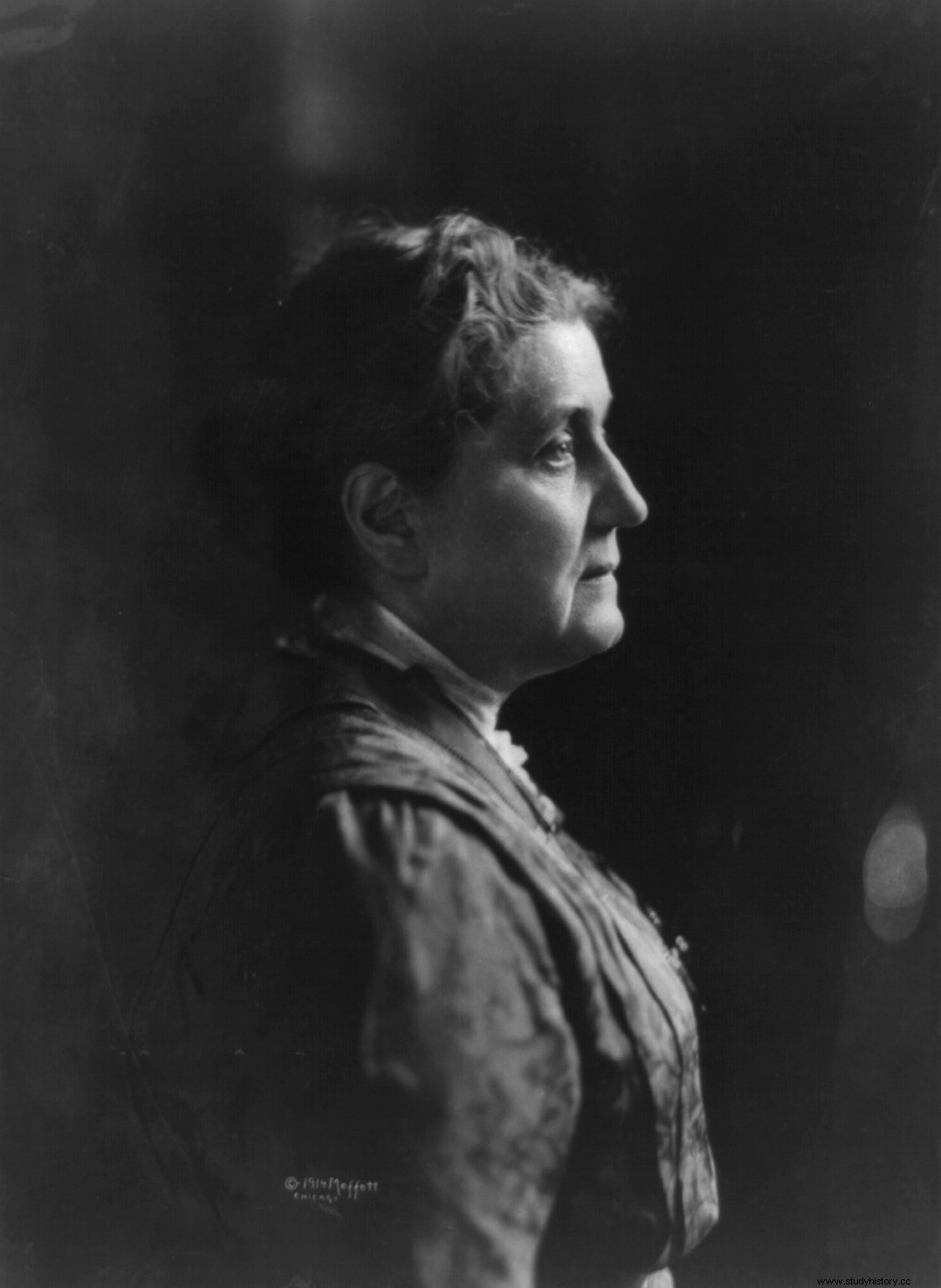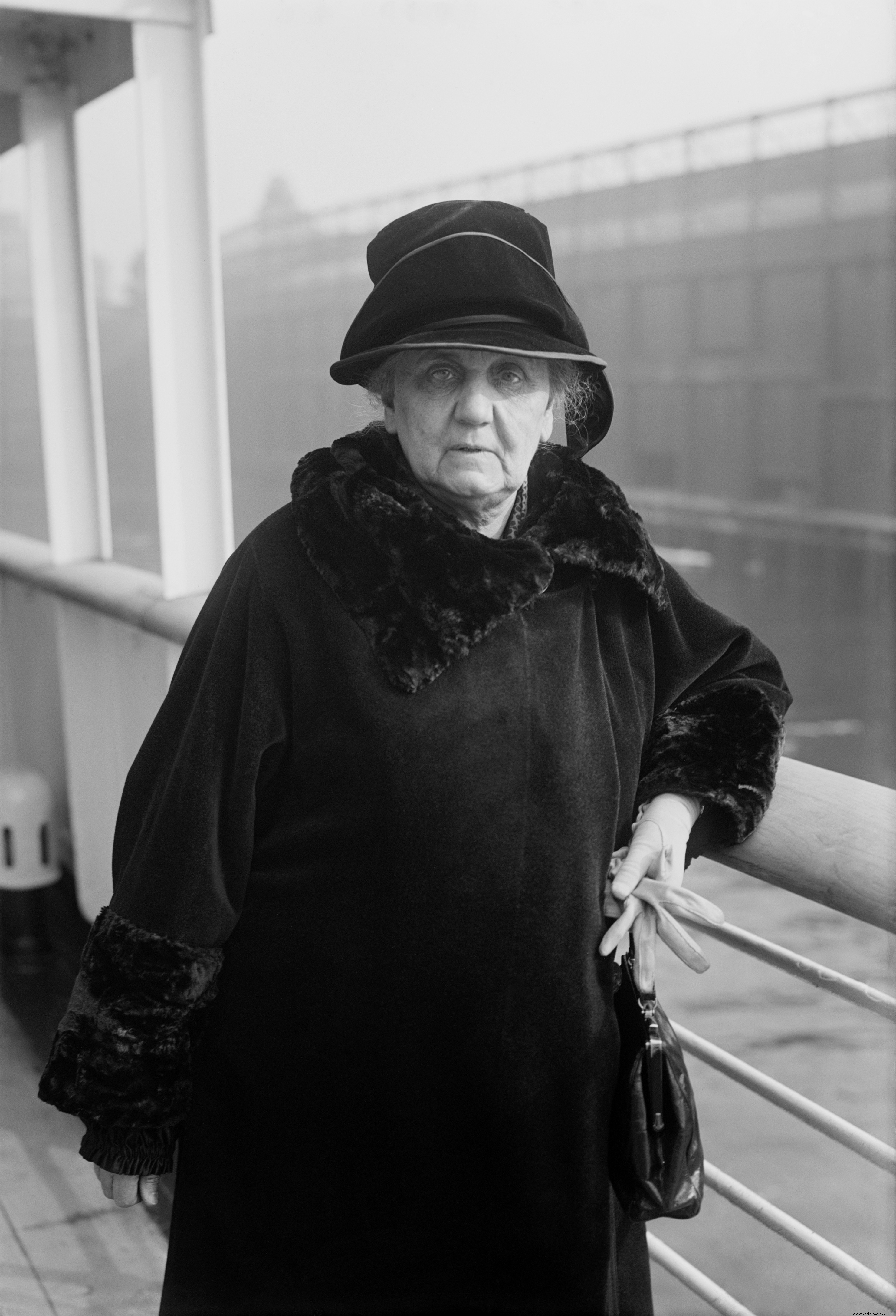Jane Addams (1860 – 1935) was an American sociologist and philosopher, pioneer and founder of social works in the United States. She has distinguished herself in particular by her commitment to social diversity, public health, peace and democracy, as well as the vote for women.
A childhood marked by illness
 Born September 6, 1860 in Illinois (USA), Jane Addams is the last of eight children of Sarah Addams and John Huey Addams, prominent and prosperous farm owner. Her childhood was marked by the death of her mother, when she was two years old, and then by illness. At the age of four, Jane contracted bone tuberculosis, which deformed her spine and caused her lifelong consequences, including lameness.
Born September 6, 1860 in Illinois (USA), Jane Addams is the last of eight children of Sarah Addams and John Huey Addams, prominent and prosperous farm owner. Her childhood was marked by the death of her mother, when she was two years old, and then by illness. At the age of four, Jane contracted bone tuberculosis, which deformed her spine and caused her lifelong consequences, including lameness.
From this moment, it becomes difficult for the little girl to get along and play with children of her age, and she develops a negative opinion of herself. Her young age was also marked by many deaths within her family:three of her siblings died in infancy and another at the age of sixteen and, when Jane was eight, there were only four children of the Addams siblings.
Make yourself useful to the world
Jane Addams took refuge in reading and studying, and dreamed of making herself useful to the world, particularly to people living in poverty. She plans to become a doctor, in order to work with disadvantaged people. Her father encouraged her and Jane began studying at Rockford Female Seminary. It was there that she met Ellen Starr, who would be her first romantic relationship. Jane graduated in 1881. The same year, John died suddenly of appendicitis.
With a few members of her family, Jane moved to Philadelphia to start studying medicine, but her health problems associated with a nervous breakdown prevented her from going all the way, and she returned to Illinois. Deciding then that she does not need to become a doctor to make herself useful to disadvantaged people, she abandons her studies and embarks on a long trip to Europe, while she still fights against depression. A great reader, she draws energy and inspiration from her reading, especially from the books of Leo Tolstoy. In 1886, she converted to Christianity.
The Chicago settlement house
After visiting the Toynbee Hall social center in England, Jane Addams decides, with Ellen, to create a "settlement house" (solidarity community bringing together and mixing social classes). In 1889, they founded Hull House in Chicago, the first settlement house in the United States and an establishment dedicated to social diversity, neighborhood life, social research, analysis and debate. Initially, Jane assumes most of the expenses related to the renovation of the building and the smooth running of the social center, but donors quickly take over. Among them, Mary Rozet Smith, who will be Jane's great love and companion until her death forty years later. Deeply linked to each other, the two women considered themselves a married couple, as evidenced by their correspondence.
Jane and Ellen are the first inhabitants of the house, which will later become the residence of twenty-five women and will welcome some two thousand people each week. The center includes an evening school for adults, clubs for children, a public kitchen, an art gallery, baths, a music school, a theater group, a library... Mainly dedicated to the very numerous European migrants in the district, the house aims in particular to offer social services, cultural events and an education system. The arts program is of particular importance to Jane, who sees art as a way to stimulate thought, diversity and interaction. Jane and Ellen develop three ethical principles for settlement houses:learning by example, cooperation, and egalitarian social democracy.
The Garbage War
 Hull House's arts programs are a success, but the center is quickly focusing on meeting the immediate needs of the neighbourhood, including childcare, education or sanitary conditions. Hull House becomes a place of study, through new statistical methods, overcrowding, literacy, access to education, infant mortality, child labor, working conditions in factories or epidemics.
Hull House's arts programs are a success, but the center is quickly focusing on meeting the immediate needs of the neighbourhood, including childcare, education or sanitary conditions. Hull House becomes a place of study, through new statistical methods, overcrowding, literacy, access to education, infant mortality, child labor, working conditions in factories or epidemics.
Noting that the working poor bear the brunt of typhoid fever, Jane Addams fights against the corruption of the city authorities, and obtains a fairer distribution of municipal services. She encourages women to get involved, beyond the home, in municipal affairs:according to her, women, competent to manage a home, must extend this role to the neighborhood and to the city. In 1894, she was the first woman appointed as a sanitary inspector in Chicago and launched a "garbage war". With the help of the women of Hull House and in the space of a year, a thousand violations of the rules of hygiene and health are denounced to the municipal council, and the collection of waste makes it possible to fight against the disease.
Commitment to peace and social justice
Alongside her activities, Jane Addams writes essays, including Democracy and Social Ethics in 1902, and gave many lectures across the country. Several universities offered her a permanent position, but she systematically refused. She explains her refusal by arguing that her role is to teach those who cannot afford higher education, and that she does not want a university to be able to control her political activities.
Jane is involved in many peace movements. Convinced that democracy, social justice and peace must progress together, she firmly opposes any war, which she describes as a cataclysm. In 1898, opposed to the American annexation of the Philippines, she joined the Anti-Imperialist League. In 1907, she published the book Newer Ideals of Peace , which seeks to include the concept of social justice in the process of world peace. In 1915, she joined the Woman's Peace Party and became its president. As such, she chaired the International Congress of Women in 1915 in The Hague, and was appointed head of the commission responsible for finding a way out of the war through dialogue with the leaders. From the entry into the war of the United States, its pacifist position is strongly criticized, and some accuse it of being unpatriotic, but it does not change its position. She was elected president of the Women's International League for Peace and Freedom. In the 1920s, she fought in the association to ban poison gas and war.
In 1931, Jane Addams received the Nobel Peace Prize in recognition of her social and pacifist actions, and the awarding of the prize was almost unanimously welcomed. She donates the endowment to the Women's International League for Peace and Freedom.
Jane Addams died on May 21, 1935. The legacy of her ideas and actions, within Hull House and the peace movement, is deeply rooted in the United States and internationally.
